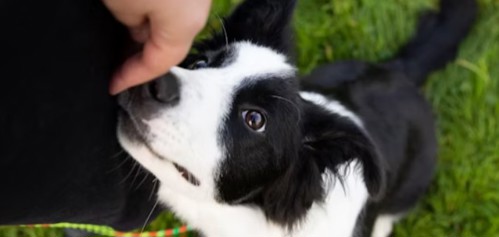
You may have heard that grapes can be toxic to dogs, but why can dogs not eat them, what would happen if they ate one and how bad can they really be? Find out all you need to know about grape poisoning, how you can help prevent your dog from eating them and when to take your dog to the vet.
Can dogs eat grapes?
Dogs shouldn’t eat or be fed grapes, raisins, currants or sultanas. If eaten, these fruits can be highly toxic to dogs and can kill them. Not all dogs are affected in the same way, and some may become more unwell than others.
Are grapes bad for dogs?
Grapes, and their dried forms, can be harmful to dogs. These fruits can cause kidney damage and can be fatal, if not treated early. Not only are grapes dangerous to dogs but so are the foods that they’re found in, such as Christmas cake, mince pies, hot cross buns etc.
Are grapes poisonous to dogs?
Grapes can be highly poisonous to dogs but are even more dangerous when dried, such as raisins, currants and sultanas. Although we know that grapes can be toxic to dogs, some dogs seem to be more sensitive than others, making it difficult to know exactly how much fruit is dangerous.
The best lifetime dog insurance
Protect your dog with the UK's Number 1 pet insurer, with up to £25,000 cover for vet fees.
Why are grapes bad for dogs?
It’s a mystery as to why grapes are poisonous to dogs. Researchers have suggested several theories but, at the moment, there’s no hard evidence to support any of them. Despite looking, scientists haven’t found any links to risk factors, such as age, sex or breed. Some researchers have suggested that grape poisoning could be caused by contamination from moulds, heavy metals or pesticides. Others have suggested it may be something within the grapes themselves, such as high levels of vitamin D or tartaric acid, but no causes have been firmly identified yet.
What types of grapes are dangerous to dogs?
All types of grapes seem to be toxic to dogs, this includes green grapes, red grapes, seedless grapes and dried grapes, including raisins, sultanas and currants. Wine and grape juice are also believed to be poisonous to dogs.
Foods that contain grapes
Dried grapes (raisins, sultanas or currants) are all considered to be more harmful than fresh grapes. These dried fruits are often used in baking, so make sure to keep your dog away from:
- Hot-cross buns
- Simnel cake
- Christmas cake
- Christmas pudding
- Mince pies
- Stollen
- Fruit panettone
- Fruit cake
- Fruit scones
- Muesli, granolas and other cereals that contain dried fruit
How long after eating grapes will a dog become sick?
After eating grapes, some dogs may be sick or have diarrhoea within 6 to 24 hours, while others may not show any signs until later. Some dogs’ kidneys may begin to stop working from one to three days after eating grapes. These dogs may not wee as much as usual or may stop weeing altogether. Dogs may also be very thirsty or seem lifeless.
Symptoms of grape poisoning in dogs
Grape poisoning can cause your dog to:
- Be sick
- Have diarrhoea
- Have tummy pain
- Seem tired or weak
- Become thirsty
- Have changes in how often they wee
- Seem dehydrated (panting or a dry nose)
- Collapse
Did you know that dogs don’t have ‘symptoms’?
When to contact your vet for advice
There isn’t a link between how much a dog eats and how unwell they can become. Contact your vet for advice if your dog eats any amount of grapes, raisins, currants or sultanas.
It’s really important that if your dog eats grapes, they are seen by their vet as soon as possible. Research has shown that the earlier their treatment is started, the better.
Can a single grape kill a dog?
Even a small number of grapes can be toxic to dogs. Some dogs can eat large amounts of grapes with no effects, while others become unwell after a small number. This makes it difficult to predict how any quantity of grapes will affect a dog.
Speak to your vet if your dog eats any grapes, raisins, currants or sultanas.
My dog ate a grape, what should I do?
Even if your dog eats one grape, raisin, currant or sultana, call your vet for advice. Any amount could make them unwell and the sooner your vet can start treating your dog, the better. Do not try to make your dog sick, as this can sometimes make them worse.
My dog ate a grape but seems fine, what should I do?
If your dog is OK, even though they ate grapes or dried grapes recently, you should still contact your vet. Not all dogs become unwell straight away and symptoms can sometimes be delayed by up to three days. It’s always best to speak to your vet for advice, even if your dog seems unaffected.
How to prevent your dog from being poisoned
- Keep grapes and dried fruit (and foods that contain them) up high, in a cupboard or out of paw’s reach
- When using or eating dried fruit, always check that none have fallen on the floor
- Make sure to tell everyone in your household about the dangers of grapes to dogs
- Be on seasonal alert. Cases of grape poisoning in the UK are more common around Easter and Christmas when seasonal foods containing sultanas and raisins are eaten (Hot cross buns, mince pies, Christmas cake etc.)
- Don’t use grapes or dried grapes as dog treats
- Make sure that young children eat these fruits away from dogs. When they’re finished, always check to make sure none have been dropped
My dog eats grapes all the time, should I stop feeding them?
Some owners say that they feed their dog grapes regularly and that their dog is fine. We don’t know why these fruits seem to affect some dogs and not others. We also don’t know whether this can change over time or whether some grapes are more poisonous than others.
We don’t recommend that owners ever feed their dogs grapes, raisins, currants or sultanas, even if they have done so before.
Find a vet near you
If you're looking for a vet practice near you, why not visit the Royal College of Veterinary Surgeons' Find a vet page.
Find a dog trainer or behaviourist
Our online register helps you find accredited dog training instructors and canine behaviourists who have proven specialist knowledge, skills and experience.Think your dog may be affected?
If you're worried about your dog's health, always contact your vet immediately!
We are not a veterinary organisation and so we can't give veterinary advice, but if you're worried about any of the issues raised in this article, please contact your local vet practice for further information

